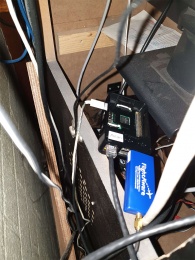Airplane Tracking
| Airplane Tracking | |
|---|---|
| Participants | Melan |
| Skills | Raspberry pi, Linux, airplanes, radio, rtl-sdr |
| Status | Active as fuck |
| Niche | |
| Purpose | Use for infra |
| Tool | No |
| Location | |
| Cost | |
| Tool category | |
adsb_pi.jpg {{#if:No | [[Tool Owner::{{{ProjectParticipants}}} | }} {{#if:No | [[Tool Cost::{{{Cost}}} | }}
What
A VM running on Coherence (sdr.dhcp.nurd.space / 10.208.42.113) tracking airplanes, in total there are 3 RTL-SDR dongles connected while only one is being used for ADS-B. The other two remain available for any other SDR purposes. The ADSB decoder used is ReadSB some of the services are running under Docker. The setup is heavily based upon this guide.
For the time being, until we restart Coherence (to enable nesting) the following services are still not running:
The following services still need to be setup:
Unclaimed feeders are (have to be done from inside the space):
- Piaware feeder
- Planefinder (?)
The antenna is located above the bar under the skylight.
How
Automatic Dependent Surveillance Broadcast (ADS-B) is a surveillance technology in which an aircraft determines its position via satellite navigation and periodically broadcasts it, enabling it to be tracked. The information can be received by air traffic control ground stations as a replacement for secondary surveillance radar, as no interrogation signal is needed from the ground. It can also be received by other aircraft to provide situational awareness and allow self-separation. ADS–B is "automatic" in that it requires no pilot or external input. It is "dependent" in that it depends on data from the aircraft's navigation system. This signal is transmitted at 1090Mhz and 978Mhz.
The decoder software (Dump1090) takes in the raw data from the SDR and parses it, we are running the forked version made by Flightradar24, which means the feeder also sends data to Flightradar24. We are also feeding this data to Flightaware and Planefinder.
Hardware
Flightaware Pro Stick Plus
- Chip: R820T2
- Amplifier: 19dB with 0.4dB noise figure and OIP3 +39dB
- TCXO: 0.5 ppm
- Filter: 1,075 MHz to 1,105 MHz pass band with insertion loss of 2.3 dB; 30 dB attenuation on other frequencies
- Power Draw: 300 mA
- Weight: 17 g / 0.6 oz
- Dimensions: 95 mm x 32 mm x 13 mm
- Antenna Port: SMA female (requires SMA antenna cable and optionally N-male adapter for large antenna)
- Range: Over 300 nm/550 km depending on installation quality
- Performance: 10-20% more Mode S messages in installations where filtering is beneficial
Feeds
We are currently feeding to the following services
| Name | Link |
|---|---|
| Adsbexchange | |
| Fr24feed | |
| Planefinder | |
| Opensky | |
| Piaware |
Ports
List of all then ports, whom they belong to, and their function.
| Port | Service | Description |
|---|---|---|
| 80 | PiAware | PiAware info |
| 8078 | Tar1090 | Dump1090 improved map |
| 8079 | Graphs1090 | Some ADS-B graphs |
| 8080 | FlightAirMap | A very complex interface |
| 8081 | VirtualRadar | A neat looking web interface |
| 8082 | Readsb | Interface |
| 8754 | Flightradar24 | Status interface |
| 9000 | Portainer | Allow some control over Docker |
| 30003 | Readsb | Mode-S? |
| 30005 | Readsb | Beast |
Todo
- Make a different antenna/remake the current antenna
- Claim feeds
- Write down some more info

